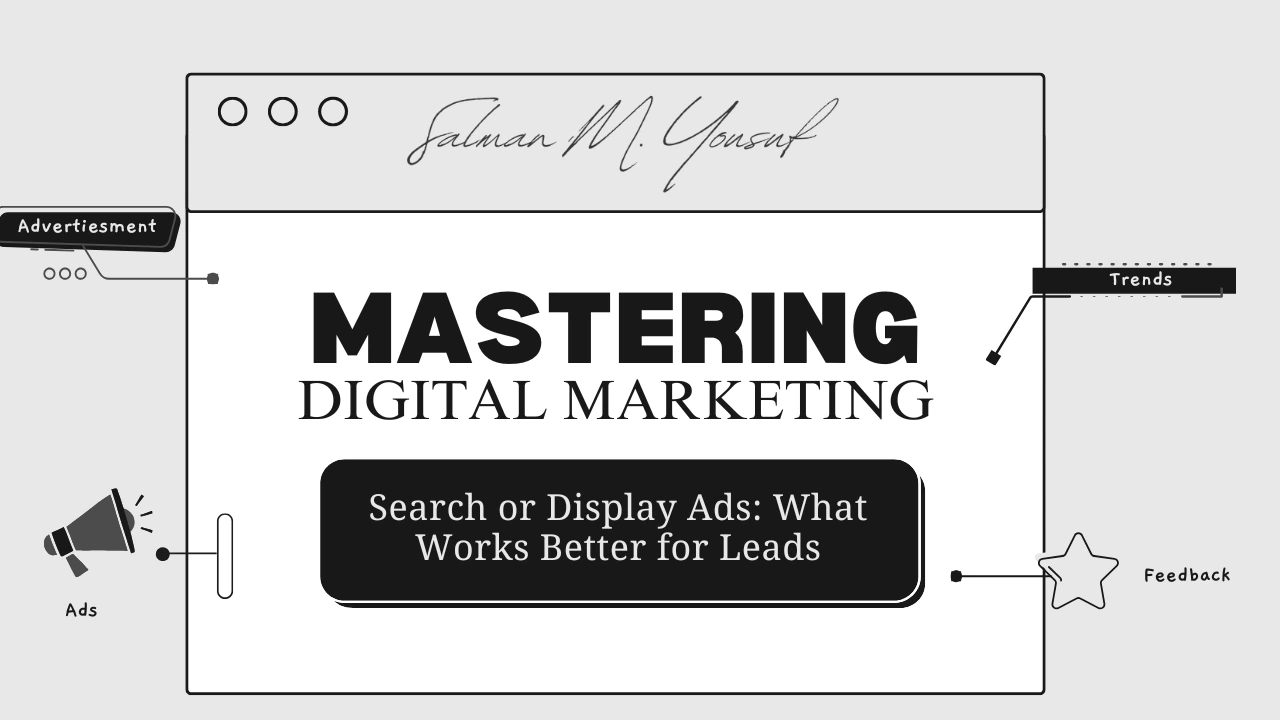
When ads appear to know exactly what we’re looking for, it’s impossible to resist. They serve as a gentle reminder that we must register for a service or buy something.
You can convince others to buy your advertisements. However, what kind of online advertisement should you run? People frequently ask us which is better: display ads or search ads. Furthermore, the solution isn’t that straightforward. Thus, let me help you find the answers to all of your queries about search v. display ads today, including:
- What is search advertising and display advertising?
- What is the difference between search ads and display ads?
- What are the benefits of display ads vs. search ads?
- How do search ads and display ads work together?
After reading this blog post, you will be able to determine whether search or display ads are better for your business and how they can complement one another to improve results. If you’ve ever needed help choosing between display and search campaigns, you’ll find the answers here.
Let’s get started!
What is Search Advertising?
You can appear on search engines for business-related queries by using search advertising. On popular platforms such as Google and Bing, these search ads—also referred to as pay per click (PPC) ads—usually appear above organic results. Many businesses track Google ads performance closely to measure clicks, conversions, and ROI, ensuring their campaigns are driving qualified leads effectively.
To run search ads, you determine a set of keywords, create a budget, and include additional targeting information, like your location, to help search engines identify the best searches to display your PPC ads.
For example, if you own a pest control business, you might choose “infestation” as one of your keywords. Your ad would then show up when someone (who’s within your targeting parameters) searches a phrase that includes the word “infestation.”

The fact that you only have to pay when someone clicks on your advertisement is one of the best things about search advertising.
What is Display Advertising?
Display ads will help you to get your business in front of people as they’re spending time browsing the web. Display ads are crucial, they include an image or a video to help you capture a user’s attention while they’re reading the local news, online shopping, or researching businesses like yours.
Display ads typically show at the top of a website and the sides but may also show in line with content.

In display advertising, you pay either when an ad is clicked (as in search advertising) or when a certain number of impressions (ad views) is reached. This targeting approach is one of the key differences in choosing between display and search campaigns, as display ads often reach audiences earlier in the buying process.
When to Use Google Display Ads v. Search Ads?
Choosing between Google Display Ads and Search Ads isn’t always easy. Both serve different purposes, and knowing when to use one over the other can make or break your campaign results. Let’s break it down in a way that helps you decide what fits your business best.
When to Use Search Ads
Search ads are the foundation of any digital marketing strategy. Here are some scenarios when you’ll want to use search ads.
1. When you want to drive traffic to your website
Creating clicks that take users to a landing page on your website is the main goal of search ads. Search ads are your best option if you want to increase website traffic from search engines, which is where most people start looking for a new company. Advertisements are an excellent way to get people to visit your website and learn about your company because they are designed to persuade searchers to take action.
2. When you want to get leads
Search drives traffic to your website, and once they are there, they can produce more leads for your company. Additionally, you have a higher chance of turning a searcher into a lead because search ads are targeted. Therefore, if someone finds your website through a search ad, they can click to call, fill out a form, or buy something!
3. When you want to boost SEO
With paid search ads, you can ensure impressions on the search results page even if your SEO is new or struggling. As you work on your local SEO, this will help guarantee that you appear for relevant searches.
When to Use Display Ads
Consider search ads to be the layers of your cake. What do you need to keep the layers together and create a delicious cake? Frosting. Display advertisements are the cherry on top of your marketing plan. You may want to use display advertising in the following situations.
1. When you want to increase awareness for your business
Display ads will help you to connect with people who might not even be searching for your company or services. When people see information about your company, they are more likely to remember you and think of you first when they need your goods or services. Additionally, this results in totally free digital brand awareness for your company, unless you decide to pay by impressions.
2. When you want to reach people across the web
Your business may be showing up in search results for relevant queries, but what about when your potential customers are spending time online shopping, reading a blog, or checking the latest news? Display ads let you target people when they’re not on search engines.
3. When you want to gain more social followers
If you truly want a healthy, balanced small business advertising plan then you’ll need a well-rounded share of display, search, and social ads. Even if you run organic social media marketing, display can boost awareness to bring more followers to your social sites.
How Search Ads and Display Ads Work Together
While they each have their own uses, search and display ads work best when they complement each other. Here’s how:
- Display ads can increase the effectiveness of search advertising
- Search ads + display ads help you target people where they’re searching and spending time
- You can couple search + display retargeting to convert more users
- Search + display ads can level out your average cost-per-click
If you’ve been comparing Google display ads v. search ads, pairing them strategically often delivers the strongest overall results.
Here’s a clear comparison chart for a better understanding:
| Feature / Factor | Search Ads | Display Ads |
| Placement | Appear in search engine results pages (Google, Bing) above or beside organic results | Appear on websites, apps, and platforms within Google Display Network or similar |
| Audience Intent | Targets users actively searching for specific products or services | Targets users based on demographics, interests, or past online behavior |
| Ad Format | Primarily text-based ads | Visual formats: images, videos, banners, and rich media |
| Best For | Capturing high-intent leads ready to take action | Building brand awareness and generating interest over time |
| Cost Model | Pay per click (PPC) | Pay per click (PPC) or pay per thousand impressions (CPM) |
| Conversion Speed | Faster conversions due to high purchase intent | Slower conversions but can influence future purchasing decisions |
| Targeting Method | Keyword targeting, location, device, and time targeting | Interest targeting, demographic targeting, remarketing/retargeting |
| Performance Tracking | Measured by clicks, conversions, and return on ad spend (ROAS) | Measured by impressions, clicks, view-through conversions, and brand lift |
| When to Use | Driving immediate traffic and leads; complementing SEO efforts | Expanding reach, retargeting, and increasing visibility across online spaces |
| Example | Ad for “pest control services” appearing when user searches “termite removal near me” | Banner ad for pest control appearing on a home improvement website |
Final Thoughts
There’s no perfect answer to decide whether search or display ads work better. Search ads capture people ready to act, while display ads keep your brand.
The best solution is to use both ads according to your needs. Display ads spark interest, and search ads turn that interest into action. Finding the right mix for your audience and goals can turn your advertising into a steady source of leads.
Struggling to get quality leads online? Feel free to reach out today and let’s discuss the perfect mix of search and display ads to drive growth and boost visibility.
FAQs
1. Which type of ad generates leads faster, search or display?
Search ads usually generate leads faster because they target people actively looking for your product or service. Display ads focus on building awareness that may convert into leads over time.
2. Are display ads worth it if I already run search ads?
Yes, display ads are valuable because they keep your brand visible when people are not searching. They can warm up audiences and encourage them to take action later.
3. Can small businesses afford both search and display ads?
Yes, small businesses can run both on a modest budget. Starting small and adjusting based on results allows you to benefit from visibility and lead generation across platforms.
4. How do I decide on my ad budget split between search and display?
Consider your goals. Search ads work best for quick leads while display ads help build brand recognition. Many businesses achieve better results by balancing their budget between both formats.
5. Do search and display ads work better together?
Yes, using both creates a complete marketing approach. Display ads introduce your brand while search ads capture ready buyers, leading to higher quality leads and better marketing performance overall.

